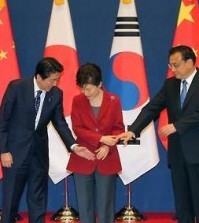- California Assembly OKs highest minimum wage in nation
- S. Korea unveils first graphic cigarette warnings
- US joins with South Korea, Japan in bid to deter North Korea
- LPGA golfer Chun In-gee finally back in action
- S. Korea won’t be top seed in final World Cup qualification round
- US men’s soccer misses 2nd straight Olympics
- US back on track in qualifying with 4-0 win over Guatemala
- High-intensity workout injuries spawn cottage industry
- CDC expands range of Zika mosquitoes into parts of Northeast
- Who knew? ‘The Walking Dead’ is helping families connect
Korea lags far behind in reform drive
Global powers overhaul economic structures to be leader in post-crisis world
By Yoon Ja-young
The government recently unveiled a three-year plan to improve the economy. However, the blueprint seems late considering other developed countries have been restructuring their economies for quite some time.
According to the Ministry of Strategy and Finance, major economies like the United States, European Union, Japan and China have been actively seeking structural reforms since the global financial crisis of 2008.
“Many countries have been pondering how to recover growth potential. If we miss the chance, the gap may widen between us and those countries,” Strategy and Finance Minister Hyun Oh-seok said at a recent media briefing.
These countries have been working to overhaul their economic structures to address the fundamental question of sustainable growth.
“As growth faltered after the global financial crisis, many countries felt they should attract foreign direct investment to boost the economy,” said Byun Yang-gyu, director of the macroeconomic policy research division at the Korea Economic Research Institute.
“As such, lowering corporate taxes and attracting foreign businesses have become a global trend,” he added.
Experts warn that Korea shouldn’t fall behind in global restructuring.
“For instance, governments around the world are competing to establish special economic zones. Chinese President Xi Jinping recently said the country should expand the free trade zone in Shanghai,” Byun said.
“What would it be like for competitors, say, if Shanghai becomes the logistics hub of East Asia instead of Singapore? Japan is establishing special economic zones, and Korea also plans to create one in Saemangeum. Every country is desperate not to fall behind.”
Boosting the domestic market
The Korea Institute for International Economic Policy (KIEP) noted that major economies around the world are focusing on boosting the domestic market and creating jobs through structural reforms.
The United States is continuing to revive the housing market, which will promote consumption. It provides tax benefits to those purchasing their first homes, similar to a measure Korea adopted.
It is also considering lowering corporate taxes and giving tax incentives to U.S. companies returning to the homeland.
“The United States is pushing to lower the corporate tax rate from 35 to 28 percent. To foster a business friendly environment, it is heading toward a ‘broad base, low tax rate,’ strategy,” KIEP said in a report. Partly thanks to such efforts, the U.S. economy has been at the forefront of the global recovery.
EU countries are also easing regulations to promote corporate investment. France, for instance, is lessening the corporate tax burden, including giving back employment-related taxes.
Japan is continuing to promote investment by cutting the tax burden of businesses. It gives the companies tax incentives for facility investment and R&D. China is also seeking to improve the industrial structure, which will increase investment and production. China is putting top priority on nurturing the services sector.
Another key phrase in the structural reform of the developed economies is “job creation.” The United States is focusing on creating jobs in the manufacturing sector by bolstering the competitiveness of 11 core technologies.
Among EU countries, Germany is creating more jobs for women, and France is seeking to expand employment of youth and the elderly through job training and subsidies. Japan is also using government funds to create jobs, provide training and improve nurseries and day care centers to help working moms.
Changing growth paradigm
The major economies are seeking structural reforms and changing the paradigm of growth.
The United States is putting top priority on strengthening the middle class. The recent health care reform program, better known as Obamacare, and expansion of the college funding program are among other measures it has implemented to lessen social inequality.
EU countries, meanwhile, are softening regulations to hone their competitive edge. France is preparing a tax reform to enhance growth and create jobs.
Meanwhile, the EU as a whole is reforming governance to lessen macroeconomic imbalances among member countries and recover public trust in the financial market.
Japan is establishing special strategic zones in Tokyo, Osaka and Nagoya to attract foreign direct investment through deregulation.
It is also establishing a control tower to nurture the health care and energy sectors, which it has designated as future growth engines, on top of reforming the agricultural sector.
China, which has enjoyed high growth led by exports and investments, is now seeking to achieve mid-level growth of around 7 percent, led by the domestic economy.
It has shifted its policy focus from quantitative growth to qualitative expansion. It is also opening up the economy, showing strong willingness to participate in global free trade agreement networks and planning the gradual opening of other sectors, including education, culture and health care.
China also plans to raise the ratio of R&D to GDP from 1.5 percent to 2.2 percent to advance the economic structure.
Korea needs master plan
Experts agree that while Korea’s three-year economic plan is in the right direction, it has hurdles to overcome. “The plan is meaningful, but it lacks a master plan on the economy as a whole,” Byun said. He pointed out that the government will be amending the plan as a result.
He also explained that previous administrations also had their own economic plans, such as ones that aimed to improve the services sector, but they haven’t achieved much.
“There are many interest groups to consider in executing the plan, such as those opposing the entry of foreign hospitals or schools in the country,” he said.
Young Soo-gil, chief of the Sustainable Development Solutions Network Korea, said Korea should be more rigorous in executing reform plans. “As the government is reluctant to overcome objections, it ends up making only superficial changes.”
One of the sectors that needs innovation is services. In its “Going for Growth” report, the OECD noted that Korea should boost competition in services and promote labor force participation of women.
“Japan’s limitation was that its domestic market was neither too big nor too small. Many businesses were somewhat satisfied with the domestic market. Korea, meanwhile, had a domestic market that was too small, which prompted the country to become a strong exporter,” Byun said.
“Now that the manufacturing sector has lost competitiveness in wages, we should start nurturing services. I think we have an advantage as we are neighbors with China, the biggest market in the world,” he said.

















